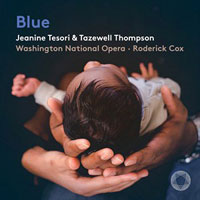JEANINE TESORI (b.1961): Blue.

Catalogue Number: 04X059
Label: PentaTone
Reference: PTC5186 967
Format: SACD hybrid
Price: $29.98
Description: Blue brings to the operatic stage the question posed by the General & Artistic Director of the Glimmerglass Festival, Francesca Zambello, “Why is the killing of innocent Black men happening all the time, and how can we use art to speak and ask the question?” This heartbreaking and omnipresent theme, with its societal, personal, and emotional ramifications, its complexity and simplicity, its capacity to divide and unite, is such a rich vein of operatic possibilities, easily equal to the class struggles, tragic love stories, betrayals and reconciliations of the traditional operatic canon, that it seems extraordinary that this seems such a revolutionary idea. Expense, of course, but also undoubtedly the reluctance of major institutions to wade against the current of racism that flows beneath - and sometimes above - the surface of America. All of it. So if this work heralds the embrace of the contemporary Black experience from a Black perspective by the world of the grand opera house, then loud cheers! It helps that Tesori's music is simply magnificent. There is, of course, a fine tradition of accessible American opera, by Carlisle Floyd and his successors, including Jake Heggie, Mark Adamo, Dominick Argento, Robert Aldridge, Louis Karchin, Missy Mazzoli. This work amply belongs in their company, and moreover in its topmost echelon. Tesori's score is tonal, and conceived on the grandest scale, and has been performed and scheduled for performance at major opera houses in the USA, familiar territory to Tesori and her distinguished librettist, the director and playwright Tazewell Thompson. One of the many remarkable aspects of the work is that, with the experience that both have in the world of music theatre, it’s not a stretch to imagine the work finding a wider audience on Broadway, where an audience that has seen Showboat or West Side Story would have no trouble assimilating its message when conveyed by a vehicle that skillfully incorporates just the right amount of jazz, showtunes, spirituals, and church music to be instantly approachable while never condescending or stereotyped. The dramatic arc of the opera could not be better; the first act (of 2) is jubilant but tinged with increasing anxiety and trepidation, played on a domestic, personal scale with humour and touching characterization of the normal, everyday experiences of Everywoman and Everyman. The second is universal, tragic, and emotionally shattering. The plot centers on a young Mother, joyfully celebrating her pregnancy and the love she receives from the baby's Father, in lively dialogue of impeccable verisimilitude with three of her girlfriends. Consternation mounts, though, as it is revealed that the baby is a boy, and thus marked for disaster, and that the Father is a Police Officer. But the Mother will have none of it. In a moving scene, the Father meets his child, awed by his own love for the infant; then his Police Officer colleagues congratulate him with raucous enthusiasm, apparently oblivious to the very idea that there was more than a passing chance that future events could take a horrifying turn. Sixteen years later, in the next scene the Son has become artistic, idealistic, and a social activist, and has had some run-ins with the Police. He upbraids his Father for being a tool of the oppressive, white system, while the Father warns him that, as a black boy he is "A walking moving target", the more so the more he resembles the stereotype of "young black troublemaker". In act 2 the all too thinkable has happened; the Son has been shot and killed by a Policeman at a protest. The scale of the work now expands, the grieving Father, the distraught Mother standing for all the Black parents whose sons didn’t come home one day. The consolations of religion are lost on the Father; the Mother is inconsolable. The three Girlfriends have now become the traditional chorus of a tragedy; no longer girlishly enthusing over a man in uniform, even a UPS driver, "Damn, girl! He’s a looker!" they now have lines like "She wears the captive shroud of stony death, dressed in forever black. We have been here before. We will walk the city blocks. The stations of the cross." The music too seems to expand, to encompass the universality of each family's tragedy in monumental, symphonic terms. In the powerful funeral scene, the parents, the Reverend, and the congregation commend the Son to the arms of the God who also lost a Son to hideous and unjust violence, and the opera ends with an epilogue blending memory of what was and a vision of what might have been. 2 CDs. Libretto included. Kenneth Kellogg (bass), Briana Hunter (mezzo), Aaron Crouch (tenor), Gordon Hawkins (baritone), The Washington National Opera Orchestra; Roderick Cox.
